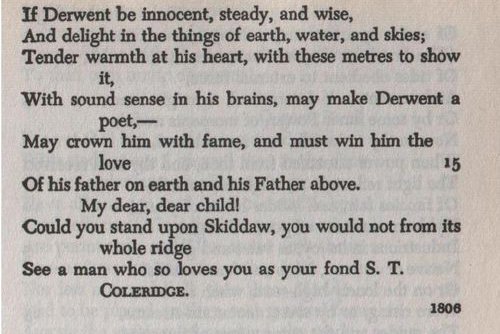The ancient Greek work Poïesis (ποίησις) “is etymologically derived from the ancient term ποιέω, which means “to make” ” (Wikipedia), pointing to the fundamentally creative aspect of poetry. Words exist, like bricks. By a making, a poet creates a poem, like a builder creates a building.
Ordering words, then, is poetry. Poets order words by placing certain words in a certain order, but also by creating structures: lines, stanzas, indentations, and so forth.
Even the most basic poetic form presents challenges to electronic texts. For instance, since multiple spaces and tabs are not recognized by basic html, how would one easily replicate the following, with the varied indents present in various lines:
Samuel Taylor Coleridge, “Metrical Feet. Lesson for a Boy” (image from this blog)
Or, how about the very common use, in poetic texts, of line numbers:
Each is, of course, possible in html… but not easily. Rendering a poem in WordPress (like this blog), for instance, is not easy at all, something I discovered personally while trying to add some poems to Free Poems on Demand.
Here is one answer to for poetical WordPress users.
In terms of Big Time, Famous Poets, when John Ashbery, “looked at the first four electronic editions of his poetry he observed that they looked nothing like the original print editions and after he complained, his publisher, Ecco, promptly withdrew all four electronic books from circulation.”
This story at poetryfoundation.org (quoting heavily from an article in today’s New York Times), however, describes how Ashbery has come around to ebooks of his poems, now that (in Ashbery’s words) “It’s very faithful to the original formatting.”
Poets, then rejoice ! Your words can sing, electric(tronically).
An essay on the Poetry Foundation site goes into detail on some of the coding approaches to poetry, and also polls some poetry (book) publishers on their approaches. It is worth reading, both for information specifically on poetry and ebooks, but also illuminating on the questions arising as publishers move from exclusively print, to print and ebooks.
Jon Ciliberto


